UAE construction strives to decarbonise
29 June 2023
There are several reasons for the UAE construction sector to decarbonise. The most compelling stand in stark contrast to each other. On one hand, the industry is a significant contributor to the national economy. On the other, it is one of the biggest contributors to global greenhouse gas (GHG) emissions.
This discrepancy makes it inevitable that the industry will have to adopt more sustainable practices.
“Can UAE construction truly achieve decarbonisation? Yes, in the long term,” says Craig Thackray, vice president – environment MEA at US-based consultancy Aecom.
“Today, it is more a matter of when this would be realistically achievable.”
A report by the Arab Monetary Fund in 2022 highlights that the construction sector contributed almost $39bn to the UAE’s GDP in 2021, accounting for 9 per cent of the nation’s $402.9bn GDP that year.
The sector is also linked to every other major sector in the UAE: it is the starting point for industries through the construction of physical environments and supporting infrastructure.
In the UAE, construction is synonymous with innovation and growth, enabling world-class projects such as the Burj Khalifa, Palm Jumeirah, Louvre Abu Dhabi and Dubai Metro.
As the country’s real estate sector enjoys demand growth, its construction players reap the benefits. Recent months have seen project announcements including Al-Habtoor Group’s estimated AED9.5bn ($2.6bn) residential developments, the AED1.2bn Upper House project by Dubai Multi Commodities Centre in partnership with Ellington Properties and the $5.4bn mixed-use Dubai South project announced by Azizi Developments. All of these represent major opportunities for contractors and their suppliers.
Environmental impact
Against all its positive contributions, however, weighs the construction industry’s negative impact on the environment.
The built environment is responsible for almost 40 per cent of global carbon emissions annually. This includes both operational carbon, which is emitted during daily use, and embodied carbon from the building materials themselves.
The World Bank estimates that about 70 per cent of global GHG emissions come from infrastructure construction and operations such as power plants, buildings and transport.
A report from the Global Alliance for Buildings & Construction during the 27th UN Climate Change conference (Cop 27) in 2022 highlights that, despite increasing investment in boosting energy efficiency and lowering energy intensity, the building and construction sector’s energy consumption and carbon dioxide (CO2) emissions have rebounded since the Covid-19 pandemic.
With rising real estate demand there comes increasing pressure from sustainability-focused investors. Property consultancy JLL notes that 63 per cent of leading real estate investors strongly agree that “green strategies can drive higher occupancy, higher rents, higher tenant retention and overall higher value”. This means that investors are actively seeking more sustainable ventures.
In a bid to stay ahead of the curve, over the past decade the UAE has introduced regulations and standards to incentivise sustainable development. These include Dubai’s green building rating system (Al-Sa’fat) and the Dubai building code, which integrates some sustainability principles; Abu Dhabi’s Pearl rating system (Estidama); and Ras al-Khaimah’s green building regulations (Barjeel) and green public procurement guidelines. More are expected to follow.
“Sustainability is on the strategic agenda in the UAE construction sector,” says Tamara Bajic, associate director – strategy and advisory at engineering consultancy AESG.
“Driven by operational expenditure reduction and green financing schemes, and supported by the UAE’s Net-Zero by 2050 pathway, a growing number of businesses are demonstrating their commitment to decarbonisation.”
Bajic says that developers are driving decarbonisation by investing in low-carbon construction materials and building envelopes; designing for solar energy utilisation; thinking upfront about operational emissions; and planning energy-efficient mechanical, electrical and plumbing systems.
Challenges arise during the implementation process, however, as well as in aligning project requirements with a contractor or supplier’s “decarbonisation maturity”, says Bajic.
At present, in the UAE market there is a lack of visibility into the sustainability processes of suppliers, and limited availability of low-carbon materials and technological solutions. “In most cases, developers cannot directly control emissions from construction activities as they are dependent on outsourced construction contractors,” adds Bajic.
Procurement teams can play a role in spotting the data blind spots and building sustainable procurement systems. “This will be key to influencing the contractors’ business models to take into account product life cycle emissions and activities performed on the construction site, and to implementing carbon-reduction initiatives,” she says.
However, reluctance remains when it comes to overhauling entrenched industry practices, notes Aecom’s Thackray.
“Change within the construction industry is a challenge as the magnitude required is significant and the proposed implementation time is limited,” he says.
Financial barriers also limit the implementation of decarbonisation measures, but this is slowly changing in light of recent commitments made by financial institutions and large clients in the UAE. First Abu Dhabi Bank has committed to lending, investing, and facilitating $75bn in sustainable finance by 2030, while Abu Dhabi Commercial Bank plans to provide AED35bn in green finance by 2030. Meanwhile, Abu Dhabi National Oil Company (Adnoc) is supporting decarbonisation by allocating $15bn for projects focused on clean power, carbon capture and storage and energy efficiency.
“Carbon-reduction initiatives are not necessarily costly if we are looking at the long-term goals,” says Bajic. “In most cases, the carbon reductions have a highly positive impact on the operational expenses, and offer fast returns.”
Working together
As changes are introduced in the industry, and the shift towards the use of sustainable building materials and cleaner fuels picks up pace, it is important to take into account the current footprint of new and existing developments, says Bajic.
“Clients and consultants can then identify initiatives that support decarbonisation and prioritise them by conducting a cost/benefit analysis to understand what is achievable within the company’s absorption capacity.
“This needs to be followed up with clear minimum sustainability requirements for new projects, as well as with incentives to support the scale-up of new technologies and access to renewable energy infrastructure.”
Thackray says that governments and clients can facilitate change through incentivisation schemes to provide tangible benefits to contractors.
“There needs to be a combination of incentives – this includes financiers and organisations establishing contract provisions to drive sustainable practices,” he says.
“Government regulation would be the most effective incentive, however, as failure to comply would have significant consequences. Legislative requirements can thus drive meaningful change to meet sustainability targets.”
Ultimately, the construction industry must take a whole life cycle approach to its projects, from design and procurement through to construction, operations and end-of-life.
“The opportunities lie in the multi-level approach and collaboration for decarbonisation,” says Bajic.
“Once the decarbonisation initiatives are drafted across the value-chain, the involved players must identify areas of collaboration and co-create the delivery of sustainable projects together with designers, architects, suppliers, contractors, and also governments and financial institutions.”
Exclusive from Meed
-
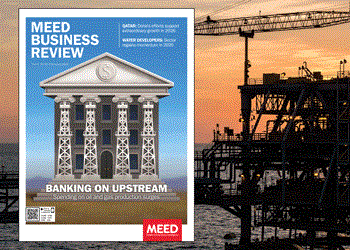 MEED set to turn 69 years old next month
MEED set to turn 69 years old next month10 February 2026
-
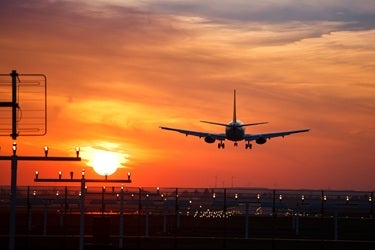 Contract award nears for Abha airport expansion PPP
Contract award nears for Abha airport expansion PPP10 February 2026
-
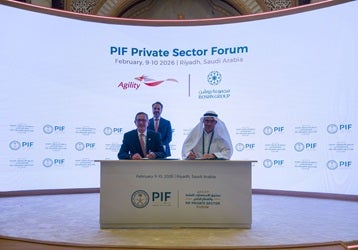 Roshn and Agility to develop logistics park in Saudi Arabia
Roshn and Agility to develop logistics park in Saudi Arabia10 February 2026
-
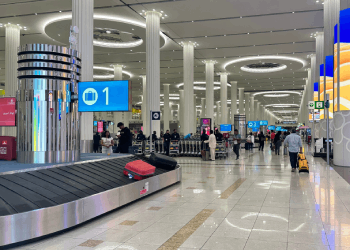 Saudi Arabia seeks Qassim airport PPP interest
Saudi Arabia seeks Qassim airport PPP interest10 February 2026
-
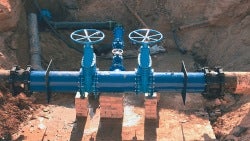 Chinese firm wins Oman sewage network contract
Chinese firm wins Oman sewage network contract9 February 2026
All of this is only 1% of what MEED.com has to offer
Subscribe now and unlock all the 153,671 articles on MEED.com
- All the latest news, data, and market intelligence across MENA at your fingerprints
- First-hand updates and inside information on projects, clients and competitors that matter to you
- 20 years' archive of information, data, and news for you to access at your convenience
- Strategize to succeed and minimise risks with timely analysis of current and future market trends

Related Articles
-
 MEED set to turn 69 years old next month
MEED set to turn 69 years old next month10 February 2026

Register for MEED’s 14-day trial access
MEED celebrates its 69th birthday early next month – a journey characterised by huge transformations and upheavals in the region, but with one constant that MEED has lived by from day one: the goal of helping the world understand what is happening in the Middle East and how to benefit from it.
MEED set out all those years ago to offer the business community and government analysts vital information on economic development and commercial opportunities in the region. While the medium might have changed, morphing from newsletter to newsstand to online, MEED has not deviated from this original, unwavering mission.
In its early days, MEED was the only comprehensive source of information on the Middle East. Now it is the region’s leading subscription-based online business intelligence service, offering – as it has done done for decades – the latest business news, interspersed with political updates, comment and analysis.
From newsletter to newstand
The first issue of Middle East Economic Digest (MEED) was published on 8 March 1957 as a hand-printed newsletter in the wake of the Suez invasion.
 Former editor the late Abdullah Jonathan Wallace – son of MEED’s founder, Elizabeth Collard (pictured, right) – remembers first working at MEED when he was 15 years old. He would come home from school on Thursday evenings to his mother’s Dickensian office in the then highly unfashionable Covent Garden area of London.
Former editor the late Abdullah Jonathan Wallace – son of MEED’s founder, Elizabeth Collard (pictured, right) – remembers first working at MEED when he was 15 years old. He would come home from school on Thursday evenings to his mother’s Dickensian office in the then highly unfashionable Covent Garden area of London.“My job was to fill the 100-or-so envelopes of the subscribers and take them to the post office. Many people would pass by on press day to help collate and staple the newsletter,” he recalled.
Collard, a feisty champion of Arab causes and the driving force behind MEED for its first two decades, had the foresight to realise the potential the Middle East offered to Western business.
A noted economic analyst on the developing world, Collard produced MEED from her one-roomed office on a hand-cranked Ronco printing machine, with the help of two part-time secretaries.
It is no coincidence that the first edition coincided with International Women’s Day, a fitting occasion for a remarkable woman who, by the late 1960s, was brought in to advise Prime Minister Harold Wilson on Middle East affairs.
 Among the friends and relatives who helped staple and stuff envelopes with the 12-page newletter was Essa Saleh al-Gurg, later to become the UAE’s ambassador to the UK, who was then training as a banker in London.
Among the friends and relatives who helped staple and stuff envelopes with the 12-page newletter was Essa Saleh al-Gurg, later to become the UAE’s ambassador to the UK, who was then training as a banker in London.Lacking any editorial resources, the Middle East Economic Digest was exactly what it said it was: a compilation from newspapers and other reports. Newspapers were flown in weekly from Cairo and Beirut, then translated and condensed. By June 1965, there were still only three staff members.
“Until the oil boom of the early 1970s, when MEED really took off, we were just about making ends meet,” said Wallace. “We could not afford to hire seasoned journalists or experienced commentators and mostly took British graduates straight from university.
“This changed a little when oil peaked around the end of 1979 at $37.42 a barrel ($111 at today's prices), but we still preferred to take on graduates and train them on the job due to our high requirement for balanced reporting and tight, accurate writing, which also needed to be finely nuanced to avoid censorship in some countries.
“In business terms, the economies of Egypt, Algeria, Syria, Iraq, Iran and Turkey dominated the interest of Western exporters in the 1960s, together with the cosmopolitan and stylish Beirut as an entrepot and banking centre.
“The oil-producing states of the GCC hardly registered on the Western business radar when I visited Dubai in 1968. The British had a firm hold on the Trucial States and infrastructure projects were undertaken by UK firms.”
The big issues covered in Wallace’s early years at MEED included the 1967 and 1973 Arab-Israeli conflicts, and the Camp David peace accords in 1978; Nasser’s death in 1970; the Lebanese civil war and the invasion of Lebanon by Syria; the 1980-89 Iran-Iraq War; and the assassinations of King Faisal Bin Abdulaziz al-Saud of Saudi Arabia in 1975 and Egypt's President Anwar Sadat in 1981.
Oil boom
By the mid-1970s, MEED had become the MEED Group and was in the enviable position of receiving half of its revenue in advance from subscriptions. The other half came from advertising. Rising income streams let to expansion, including the launch of the African Economic Digest and the largest photographic library in the Middle East. A conference division was also started, which broke new ground, holding the Gulf's first banking conference in Bahrain in the late 1970s.
“Increased revenue meant we could send our reporters to the region on a regular basis, open a bureau in Dubai and then Paris and Washington, and upgrade our typesetting and production equipment to allow us to print on faster, more sophisticated printing machines,” said Wallace.
Since its launch in 1957, MEED has been tackling news issues head-on with groundbreaking exclusives that shape the Middle East
By mid-1986, when it was acquired by Emap, MEED had far outgrown its early role of monitoring published news reports. It had a staff of 20 full-time journalists and 12 researchers and newsroom assistants, with more than 30 correspondents overseas, mostly in the Middle East itself.
The newsletter of the early days became a weekly magazine, and then, as the face of media changed, transformed into a subscription-based online business intelligence service, which now publishes a monthly magazine, MEED Business Review. The business also includes MEED Projects, a subscription-only service offering in-depth project tracking through its database; and MEED Insight, MEED’s premium research division.
Today, MEED is owned by GlobalData, a data analytics and consulting company, headquartered in London, UK, that acquired MEED Media from Ascential PLC in December 2017. The business is still growing, with more than 60 members of staff in its Dubai office.

https://image.digitalinsightresearch.in/uploads/NewsArticle/15615163/main.gif -
 Contract award nears for Abha airport expansion PPP
Contract award nears for Abha airport expansion PPP10 February 2026

Saudi Arabia’s Civil Aviation Holding Company (Matarat) and the National Centre for Privatisation & PPP (NCP) are said to be close to awarding a contract to develop and operate a new passenger terminal building and related facilities at Abha International airport.
MEED understands that the negotiations are in the final stages and the contract will be awarded within a few weeks.
The companies prequalified to bid for the contract are:
- GMR Airports (India)
- Mada TAV: Mada International Holding (local) / TAV Airports Holding
- Touwalk Alliance: Skilled Engineers Contracting (local) / Limak Insaat (Turkiye) / Incheon International Airport Corporation (South Korea) / Dar Al-Handasah Consultants (Shair & Partners, Lebanon) / Obermeyer Middle East (Germany/Abu Dhabi)
- VI Asyad DAA: Vision International Investment Company (local) / Asyad Holding (local) / DAA International (Ireland)
Located in Asir Province, the first phase of the Abha International airport public-private partnership (PPP) project will expand the terminal area from 10,500 square metres (sq m) to 65,000 sq m.
In March last year, the clients held one-on-one meetings with prospective bidders in Riyadh.
The contract scope includes a new rapid-exit taxiway on the existing runway, a new apron to serve the new terminal, access roads to the new terminal building and a new car park area.
Additionally, the scope includes support facilities, such as an electrical substation expansion and a new sewage treatment plant.
Construction is scheduled for completion in 2028.
The project will be developed under a build-transfer-operate (BTO) model and will involve designing, financing, constructing and operating a greenfield terminal.
This will be the kingdom’s third airport PPP project, following the Hajj terminal at Jeddah’s King Abdulaziz International airport and the $1.2bn Prince Mohammed Bin Abdulaziz International airport in Medina.
Higher capacity
According to Matarat, Abha airport’s capacity will increase to accommodate over 13 million passengers annually – a 10-fold rise from its current 1.5 million capacity.
Once completed, the airport will handle more than 90,000 flights a year, up from 30,000.
The new terminal is also expected to feature 20 gates and 41 check-in counters, including seven new self-service check-in kiosks.
The BTO contract duration is 30 years.
The existing terminal, which served 4.4 million passengers in 2019, will be closed once the new terminal becomes operational.
Matarat’s transaction advisory team for the project comprises UK-headquartered Deloitte as financial adviser, ALG as technical adviser and London-based Ashurst as legal adviser.
ALSO READ: Saudi Arabia seeks Qassim airport PPP interest
https://image.digitalinsightresearch.in/uploads/NewsArticle/15615074/main.jpg -
 Roshn and Agility to develop logistics park in Saudi Arabia
Roshn and Agility to develop logistics park in Saudi Arabia10 February 2026
Saudi Arabian gigaproject developer Roshn Group has signed an agreement with Kuwait’s Agility Logistics Parks (ALP) to establish a joint venture to develop a Grade A logistics park in the kingdom.
The agreement was signed on the sidelines of the Public Investment Fund Private Sector Forum in Riyadh on 9 February.
The joint venture will develop the project on an area of about 1 million to 1.5 million square metres (sq m).
The project’s timeline, budget and exact location were not disclosed.
In November last year, ALP inaugurated a new Grade A logistics park in Jeddah.
The company subsequently said it would add 100,000 sq m of Grade A warehousing to the ALP warehousing complex in Riyadh. The expansion was expected to cost about SR250m ($66m).
The company also operates a 200,000 sq m logistics park in Dammam and a 871,000 sq m facility in Riyadh.
Roshn Group’s latest agreement follows its signing of a memorandum of understanding (MoU) with UK-headquartered Cognita Schools to develop a new build-to-suit private school in its Sedra residential community in Riyadh.
The MoU was signed on the sidelines of the Cityscape Global event held in Riyadh in November last year.
Cognita operates more than 100 schools across 21 countries, serving over 100,000 students and employing 21,000 staff. It is already present in the region through schools such as Royal Grammar School Guildford Dubai, the Repton Family of Schools and King’s College Riyadh.
 READ THE FEBRUARY 2026 MEED BUSINESS REVIEW – click here to view PDF
READ THE FEBRUARY 2026 MEED BUSINESS REVIEW – click here to view PDFSpending on oil and gas production surges; Doha’s efforts support extraordinary growth in 2026; Water sector regains momentum in 2025.
Distributed to senior decision-makers in the region and around the world, the February 2026 edition of MEED Business Review includes:
> AGENDA: Mena upstream spending set to soar> INDUSTRY REPORT: MEED's GCC water developer ranking> INDUSTRY REPORT: Pipeline boom lifts Mena water awards> MARKET FOCUS: Qatar’s strategy falls into place> CURRENT AFFAIRS: Iran protests elevate regional uncertainty> CONTRACT AWARDS: Contract awards decline in 2025> LEADERSHIP: Tomorrow’s communities must heal us, not just house us> INTERVIEW: AtkinsRealis on building faster> LEADERSHIP: Energy security starts with rethinking wasteTo see previous issues of MEED Business Review, please click herehttps://image.digitalinsightresearch.in/uploads/NewsArticle/15614887/main.jpg -
 Saudi Arabia seeks Qassim airport PPP interest
Saudi Arabia seeks Qassim airport PPP interest10 February 2026
Saudi Arabia’s Civil Aviation Holding Company (Matarat), through the National Centre for Privatisation and PPP (NCP), has issued an expression of interest (EoI) for a tender to develop the Prince Naif Bin Abdulaziz International airport in the Qassim region.
The EoI notice was issued on 9 February, and companies have until 23 February to submit responses.
The project scope includes the redevelopment of the passenger terminal as well as other associated facilities such as airside infrastructure, including runway, taxiways and aprons.
The project will be developed on a design, finance, construction, operations, maintenance and transfer basis.
The latest development follows Matarat Holding and NCP prequalifying five teams to bid for a contract to develop the new Taif international airport project in Mecca province in January.
According to local media reports, four consortiums and one standalone company have been prequalified to proceed to the next stage of the project.
The new Taif International airport will be located 21 kilometres southeast of the existing Taif airport, with a capacity to accommodate 2.5 million passengers by 2030.
The clients opted for a 30-year build-transfer-operate (BTO) contract model, including the construction period.
Previous tenders
The Taif, Hail and Qassim airport schemes were previously tendered and awarded as PPP projects using a BTO model.
Saudi Arabia’s General Authority of Civil Aviation (Gaca) awarded the contracts to develop four airport PPP projects to two separate consortiums in 2017.
A team of Tukey’s TAV Airports and the local Al-Rajhi Holding Group won the 30-year concession agreement to build, transfer and operate airport passenger terminals in Yanbu, Qassim and Hail.
A second team, comprising Lebanon’s Consolidated Contractors Company, Germany’s Munich Airport International and local firm Asyad Group, won the BTO contract to develop Taif International airport.
However, these projects stalled following the restructuring of the kingdom’s aviation sector.
Saudi Arabia has already privatised airports, including the $1.2bn Prince Mohammed Bin Abdulaziz International airport in Medina, which was developed as a PPP and opened in 2015.
https://image.digitalinsightresearch.in/uploads/NewsArticle/15614875/main.png -
 Chinese firm wins Oman sewage network contract
Chinese firm wins Oman sewage network contract9 February 2026

China’s Hunan Installation Overseas Engineering has won an engineering, procurement and construction (EPC) contract to build water supply and sewage networks in the Al-Khuwair 17-1 municipal planning zone in Muscat, Oman.
The contract awarded by state utility Nama Water Services (NWS) covers the construction of water supply, drainage and treated effluent (TE) systems.
The scope of work includes the supply and installation of about 30 kilometres of sewage pipelines and 15km of water supply pipelines.
Hunan Installation has been expanding in Oman recently through contracts with NWS.
According to MEED Projects, the contractor was awarded a $37m EPC contract last March to build water distribution networks and housing connections in Khasab, Musandam Governorate.
In 2024, it won a $70m contract from NWS for a major water distribution scheme in the wilayats of Samail and Izki. The project includes reservoirs, pumping stations and more than 400km of pipelines.
Unlike its previous NWS contracts, which focused on the distribution of potable water, Hunan Installation’s job for the Al-Khuwair scheme covers water supply along with sewage and drainage networks.
Hunan Installation recently submitted a bid for another NWS tender covering the construction of a $60m water distribution network in A’Seeb, Muscat, under Package 3 (Phase 2).
The $60m project has attracted seven commercial bids:
- Towell Infrastructure Projects (Oman): $52.08m
- Target (Oman): $55.12m
- Hunan Industrial Installation (China): $56.96m
- Societe Egyptienne d’Entreprises (Egypt): $58.30m
- Hassan Allam Construction (Egypt): $59.61m
- United Gulf Construction Company (Oman): $73.27m
- Petrojet & Partners (Egypt): $863.70m
NWS is also procuring for the construction of an $80m water transmission system project, which has attracted seven bids, with the lowest bid from local contractor Eastern Overseas ($52.94m).
Contracts for both projects are expected to be awarded in this quarter.
 READ THE FEBRUARY 2026 MEED BUSINESS REVIEW – click here to view PDF
READ THE FEBRUARY 2026 MEED BUSINESS REVIEW – click here to view PDFSpending on oil and gas production surges; Doha’s efforts support extraordinary growth in 2026; Water sector regains momentum in 2025.
Distributed to senior decision-makers in the region and around the world, the February 2026 edition of MEED Business Review includes:
> AGENDA: Mena upstream spending set to soar> INDUSTRY REPORT: MEED's GCC water developer ranking> INDUSTRY REPORT: Pipeline boom lifts Mena water awards> MARKET FOCUS: Qatar’s strategy falls into place> CURRENT AFFAIRS: Iran protests elevate regional uncertainty> CONTRACT AWARDS: Contract awards decline in 2025> LEADERSHIP: Tomorrow’s communities must heal us, not just house us> INTERVIEW: AtkinsRealis on building faster> LEADERSHIP: Energy security starts with rethinking wasteTo see previous issues of MEED Business Review, please click herehttps://image.digitalinsightresearch.in/uploads/NewsArticle/15608736/main.jpg


